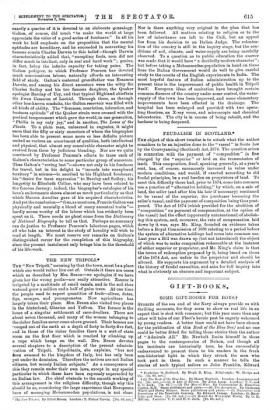FEUDALISM IN SCOTLAND.*
THE object of this short treatise is to attack what the author considers to be an injustice done to the "vassal" in Scots law by the Conveyancing (Scotland) Act, 1874. The question arises in connexion with the payment of " compogition" (a fine charged by the " superior " or lord on the transmission of land). This composition, fixed, speaking generally, at a year's rent, has, of course, enormously increased in value under modern conditions, and would, if exacted according to old feudal principles, be a real burden on proprietors of land. To meet this difficulty there had, prior to 1874, come into common use a practice of "alternative holding," by which, on a sale of land, the seller (and after him his heir if necessary) continued to be vassal of the superior, the purchaser becoming the seller's vassal, and the payment of composition being thus post- poned. The Act of 1874 (which provided for the abolition of "composition" on payment of compensation, at the option of the vassal) had the effect (apparently unintentional) of abolish- ing this system, and, moreover, the rate of compensation laid down by it was, says Mr. King, founded on evidence taken before a Royal Commission of 1838 relating to a period before the system of alternative holdings bad come into common use. Last year a Bill was drawn up (but not introduced) the object of which was to make composition redeemable at the instance of either superior or proprietor, and Mr. King's claim is that the terms of redemption proposed b.y it, being based on those of the 1874 Act, are unfair to the proprietor and should be altered. He supports his argument by a detailed analysis of the history of feudal casualties, and asks for full inquiry into what is obviously an obscure and important subject.














































 Previous page
Previous page